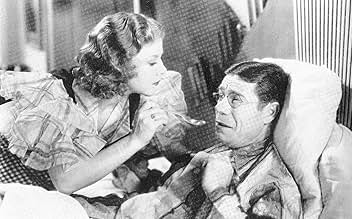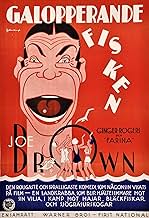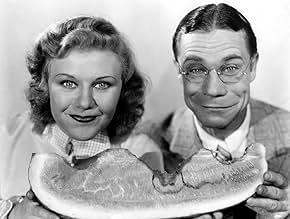Ajouter une intrigue dans votre langueShipping clerk Joe Holt is mistaken for a swimming champion and expected to compete in a long-distance swim race off Catalina Island.Shipping clerk Joe Holt is mistaken for a swimming champion and expected to compete in a long-distance swim race off Catalina Island.Shipping clerk Joe Holt is mistaken for a swimming champion and expected to compete in a long-distance swim race off Catalina Island.
- Director
- Writers
- Stars
- Prix
- 1 victoire au total
Preston Foster
- Ed Dover
- (as Preston S. Foster)
Allen 'Farina' Hoskins
- Sam Wellington
- (as Farina)
Oscar Apfel
- Armstrong
- (uncredited)
Spencer Bell
- Porter
- (uncredited)
Don Brodie
- Judge's Assistant
- (uncredited)
William Burress
- Roger Colby
- (uncredited)
A.S. 'Pop' Byron
- Elliott
- (uncredited)
Eddy Chandler
- Harbor Steward
- (uncredited)
James Eagles
- Messenger
- (uncredited)
Bess Flowers
- Race Fan on Boat
- (uncredited)
June Gittelson
- Fat Swimmer in Lane #1
- (uncredited)
Frank Hagney
- Holt's Manager
- (uncredited)
Avis en vedette
1932. The snappy opening music. The Dilbert with his Big Idea, laughed out of the office. Goes to L.A. to get an inheritance. Thanks to a shyster lawyer, ends up with only 5 dollars and a pickaninny. Destitiute, As it happened, our hero and ward were bound for Catalina for a $6 day job, when fate stepped in. Mistaken for a marathon swimmer and ends up in the Catalina race for $25,000, though he can't swim. Plug Joe E. Brown into this farce, and you have an early talkie classic. Of course, much of this will offend the politically correct, and much of the humor will escape current audiences. But there are so many fun moments -- the mock-cerebral inner dialogs of the half-wit hero, the amazing costumes (were they serious back then?), the vintage shots of Catalina Island, Ginger Rogers' fresh plump face, the wonderful "I found my heart in Avalon" soundtrack....
In real life, Wrigley had offered a $25,000 prize for swimming first from Catalina to the mainland. And some actually entered who couldn't swim. But 1932 was the Depression, and people would do anything for a windfall, even if they couldn't.
Of course, much of this seems corny and dated, but watch it more than once, and I think the rustic charm will grow on you. There will never be another Joe E. Brown. After all, "Nobody's perfect."
In real life, Wrigley had offered a $25,000 prize for swimming first from Catalina to the mainland. And some actually entered who couldn't swim. But 1932 was the Depression, and people would do anything for a windfall, even if they couldn't.
Of course, much of this seems corny and dated, but watch it more than once, and I think the rustic charm will grow on you. There will never be another Joe E. Brown. After all, "Nobody's perfect."
It has been a few days since I viewed "You Said a Mouthful," but it has stayed in memory so strongly, even with having seen other films since then. There are several things about this film that I thoroughly enjoyed and appreciated. The film, no doubt, has a comedic undercurrent, with the story swirling in impracticality, but it has a near-serious air nonetheless, albeit built on an absurd premise. The wilder moments of hilarity are kept wisely to a successful few. The beautifully accomplished editing in this program must have been a challenge.
Joe E. Brown gives a thoughtful and admirable acting performance between his bouts of comedic antics. His physicality is impressive, too. The interdependent relationship between Brown and young Allen Hoskins is highly affecting and serves to ameliorate Brown's too-easy shedding of personal integrity in his effort to do something of value for the world, in particular inventing the unsinkable bathing suit. As the film moves along we come to feel sympathy for Brown's constantly finding himself a victim of ridicule and bad luck, so we also come to forgive him for his habitual disregard of scruples.
The film is given sexual energy by Ginger Rogers' presence, who provides a stabilizing and glamorous softness to the film; she is, of course, the primary reason Brown's character enters the swim competition and strives to win the race. Rogers seems quite comfortable in her interplay with Brown.
The movie has some eerily atmospheric moments underwater, too, which only make the movie all the more different and captivating. Additionally, the scenes around 1930's Avalon are bonus treats for the viewer. I can remember when swims across the channel were followed with much curiosity and passion many decades ago, so in this way the film serves as a historical document of sorts, too. It is also nostalgic to see the legendary SS Catalina moving into the harbor in Avalon.
In summary, "You Said a Mouthful" has a lot going for it and deserves recognition as a respectable and highly entertaining film. Fans of 1930's films need to give it a chance, while fans of Joe E. Brown and/or Ginger Rogers definitely should see it.
Joe E. Brown gives a thoughtful and admirable acting performance between his bouts of comedic antics. His physicality is impressive, too. The interdependent relationship between Brown and young Allen Hoskins is highly affecting and serves to ameliorate Brown's too-easy shedding of personal integrity in his effort to do something of value for the world, in particular inventing the unsinkable bathing suit. As the film moves along we come to feel sympathy for Brown's constantly finding himself a victim of ridicule and bad luck, so we also come to forgive him for his habitual disregard of scruples.
The film is given sexual energy by Ginger Rogers' presence, who provides a stabilizing and glamorous softness to the film; she is, of course, the primary reason Brown's character enters the swim competition and strives to win the race. Rogers seems quite comfortable in her interplay with Brown.
The movie has some eerily atmospheric moments underwater, too, which only make the movie all the more different and captivating. Additionally, the scenes around 1930's Avalon are bonus treats for the viewer. I can remember when swims across the channel were followed with much curiosity and passion many decades ago, so in this way the film serves as a historical document of sorts, too. It is also nostalgic to see the legendary SS Catalina moving into the harbor in Avalon.
In summary, "You Said a Mouthful" has a lot going for it and deserves recognition as a respectable and highly entertaining film. Fans of 1930's films need to give it a chance, while fans of Joe E. Brown and/or Ginger Rogers definitely should see it.
Abandon all connections with reality ye who watch this movie. This is a silly comedy. Joe E. Brown stars as Joe Holt, a dreamer who works in the shipping room of a swimwear company. He is also the target of his bullying coworkers, so when he finds he has inherited a million dollars, he packs and moves to California. The fortune turns out to be much less than imagined. Plus his aunt's will asks that he take charge of the son of the aunt's homemaker. Sam is a young black boy who quickly latches onto Joe as a father figure.
Low on funds, Joe decides to take a job in a hotel on Catalina. Joe is mistaken for a champion long distance open water swimmer and is entered in a race from Catalina to the mainland, though he can't swim.
Ginger Rogers plays Alice Brandon, the young woman who somehow becomes his sweetheart, but promises to stick with him only if he wins the race. At this point in her career, Ginger has become a screen presence, showing much more ease and talent than just a couple of years before.
Joe E. plays his character with his usual physicality, wackiness and indomitable self-confidence. But his trademark big-mouth yell is overused here and becomes tiresome. Also overdone is a long bit where he "waterskis" behind a motorboat. Note that he wears his glasses even when swimming.
Low on funds, Joe decides to take a job in a hotel on Catalina. Joe is mistaken for a champion long distance open water swimmer and is entered in a race from Catalina to the mainland, though he can't swim.
Ginger Rogers plays Alice Brandon, the young woman who somehow becomes his sweetheart, but promises to stick with him only if he wins the race. At this point in her career, Ginger has become a screen presence, showing much more ease and talent than just a couple of years before.
Joe E. plays his character with his usual physicality, wackiness and indomitable self-confidence. But his trademark big-mouth yell is overused here and becomes tiresome. Also overdone is a long bit where he "waterskis" behind a motorboat. Note that he wears his glasses even when swimming.
Joe E. Brown comedy about an inventor of an "unsinkable bathing suit" who is mistaken for a champion swimmer. Ginger Rogers plays the girl who falls for him but doesn't know the truth. Black child actor Allen 'Farina' Hoskins is great as Brown's ward he inherited from his aunt. I'm not the biggest fan of Joe E. Brown. I often find him to be a very limited comedian, relying solely upon rubberfacing and exaggerated voices -- the kind of stuff that toddlers laugh at. But every once in awhile I come across one of his movies that impresses me. This is one of those movies. Brown actually plays a character here instead of himself, which means he actually acts. My favorite parts were the little bits of business where we'd get to hear Brown's thoughts, which sound like lines from a bad novel. Fans of Brown will undoubtedly like this one but it's also one of his few movies I've seen that I would recommend to non-fans.
Joe E. Brown is a member of that exclusive club of actors (such as "Singin' in the Rain's" Jean Hagen) who would probably be forgotten but for one role that made them immortal. (You may at one time have been exposed to Brown's "Nobody's perfect.") Before today, I'd have run out of Brown roles after a second (Cap'n Andy in "Showboat").
But TCM, bless its heart, has been running a festival of Brown films from the early sound era, which showcase the young Joe as a superb physical comedian as well as the yowling rubberface we remember so fondly.
"You Said a Mouthful" seems typical of Brown's early films: The naive and good-hearted Joe gets himself caught up in a sticky situation that is ultimately resolved through a display of goofy yet surprisingly impressive physical prowess (reminiscent of, although nowhere nearly as surreal as, Keaton's). And because of the physical nature of the comedy, much of the action takes place outdoors, which makes the films seem fresher and more grounded in reality, in spite of all the old cars and "funny" clothes. Also (even though I've seen nothing I would call vulgar or even risque), the fact that these films were made before the stranglehold of the Production Code seems to allow for a much fresher attitude towards physical expression (including the occasional glimpse of a little harmless flesh) than you'd see in films made just a few years later (and which now seem far more antique).
Is it time for a re-appreciation of Joe E. Brown?
But TCM, bless its heart, has been running a festival of Brown films from the early sound era, which showcase the young Joe as a superb physical comedian as well as the yowling rubberface we remember so fondly.
"You Said a Mouthful" seems typical of Brown's early films: The naive and good-hearted Joe gets himself caught up in a sticky situation that is ultimately resolved through a display of goofy yet surprisingly impressive physical prowess (reminiscent of, although nowhere nearly as surreal as, Keaton's). And because of the physical nature of the comedy, much of the action takes place outdoors, which makes the films seem fresher and more grounded in reality, in spite of all the old cars and "funny" clothes. Also (even though I've seen nothing I would call vulgar or even risque), the fact that these films were made before the stranglehold of the Production Code seems to allow for a much fresher attitude towards physical expression (including the occasional glimpse of a little harmless flesh) than you'd see in films made just a few years later (and which now seem far more antique).
Is it time for a re-appreciation of Joe E. Brown?
Le saviez-vous
- AnecdotesAccording to studio records, shooting took 31 days.
- GaffesSam helps Joe grease up for the big swimming race. In the first shot (close-up), he is greasing Joe's right thigh, and Joe's leg below the knee is clean. The next close-up shows Sam working his way down Joe's calf. In a subsequent long shot, Joe's right calf is greased up to the knee, but his thigh is clean.
- Bandes originalesAvalon
(uncredited)
Composed by Vincent Rose
Based on "E lucevan le stelle" from "Tosca" by Giacomo Puccini
[Played during the opening photo credits and often in the score]
Meilleurs choix
Connectez-vous pour évaluer et surveiller les recommandations personnalisées
- How long is You Said a Mouthful?Propulsé par Alexa
Détails
- Date de sortie
- Pays d’origine
- Langue
- Aussi connu sous le nom de
- Galopperande fisken
- Lieux de tournage
- William Wrigley Jr. Summer Cottage or Mt. Ada, 76 Wrigley Road, Avalon, Santa Catalina Island, Californie, États-Unis(outdoor balcony overlooking Avalon Bay)
- société de production
- Consultez plus de crédits d'entreprise sur IMDbPro
Box-office
- Budget
- 223 000 $ US (estimation)
- Durée
- 1h 10m(70 min)
- Couleur
- Mixage
- Rapport de forme
- 1.37 : 1
Contribuer à cette page
Suggérer une modification ou ajouter du contenu manquant


































